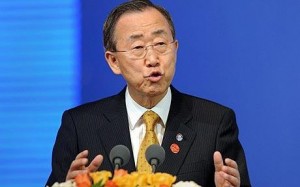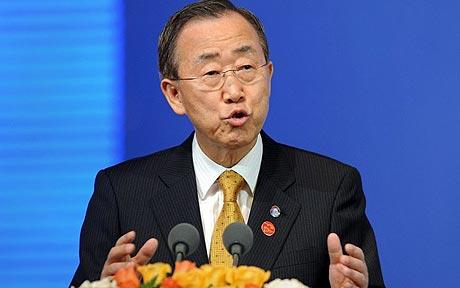
The United Nations’ Secretary General Ban Ki-Moon delivered a speech late Monday at the UN Council on Foreign Relations in which he addressed the current situation in Egypt, on the backdrop of the Syrian crisis and climate change.
He spoke at length on the Syrian issue, saying there was a broader lesson to be learnt: “In the Arab world and elsewhere, people want real change, not grudging, cosmetic adjustments.” He warned countries emerging from civil conflict or authoritarian regimes that the road to transition will not be “linear marches towards Jeffersonian democracy or Swiss-style tranquillity”.
“The road will be rocky,” he said.
Ban said the world must “resist the temptation to see the current troubles in Egypt or Libya as proof that the old order was a better one”, adding that history has shown the world that post-revolutionary disorder is a passing phenomenon.
He continued by saying the international community has a duty to “accompany such transitions with meaningful contributions”, referring to promised aid for transitory nations such as Egypt and the myriad of pre-conditions halting the aid.
On the Syrian issue and climate change, he warned that the international community was not upholding its responsibilities. He added that Syria is “self-destructing”. He said that after two years of fighting, the days are not counted in hours, but in bodies.
“Another day, another 100, 200, 300 dead,” he said grimly.
Ban pointed at the rise of sectarian hatred, the mounting war crimes and widespread sexual violence in Syria, adding that the destruction is systematic and the nation is being torn apart “limb by limb”.
“Four million people—one out of every five Syrians—are in need of immediate assistance,” Ban said. He cited the 750,000 who people who have fled the country, putting a major strain on Syria’s neighbours and risking regional stability.
Ban stressed the UN’s responsibility to tackle the root of the issue, “but for the moment, division rules the day” inside Syria, the region and the UN Security Council. The regime, he added, “remains as repressive as ever”.
“The Security Council must no longer stand on the sidelines, dead-locked, silently witnessing the slaughter,” Ban said. “It must be willing, at long last, to come together and establish the parameters for the democratic transition that could save Syria.”
He pointed at the Syrian National Coalition (SNC) leader Moaz Al-Khatib’s call for an end to violence through negotiations with the Bashar Al-Assad’s government, calling it an opportunity the international community should not miss.
“We need to find a way towards negotiations between empowered government and opposition delegations that can make key decisions about the country’s future—on elections, on constitutional reform, on accountability for victims of international crimes, on other steps needed to meet the people’s legitimate aspirations,” Ban stressed.
“It is time for a clean break from Syria’s past, and for a decisive turn toward a future where Syrians are able to express their political views freely, without fear of arbitrary arrest or killing; a Syria where the human rights of all are protected.”
On climate change, Ban spoke at length on the need to address the growing concerns echoed by scientists on the impact humans are having on the environment. He said greenhouse emissions are on the rise faster than ever before, and “business as usual retains its hold”.
He said the global rise in temperature must be limited to two degrees celsius, a massive drop from the currently predicted six degree rise by 2100, criticising politicians for keeping the issue at arm’s length and not falling in line with the scientists and a growing number of military commanders, as well as the general public’s growing awareness of the matter.
“It is time to move beyond spending enormous sums addressing the damage, and to make the investments that will repay themselves many times over,” Ban said, adding that as much as 80% of the world’s energy demands could be met with renewable energy by the mid century mark.
Ban also had strong words for the international community on the Israeli-Palestinian conflict, saying it was high time to solve the conflict and “we must stop finding excuses as to why the issues are too hard”.
Ban also addressed North Korea’s government, saying it was time they heeded the unified call of the international community and return to dialogue on the issue of non-proliferation.



